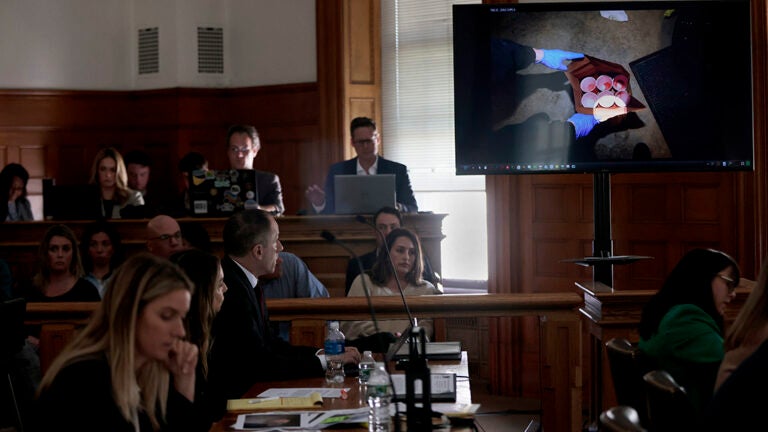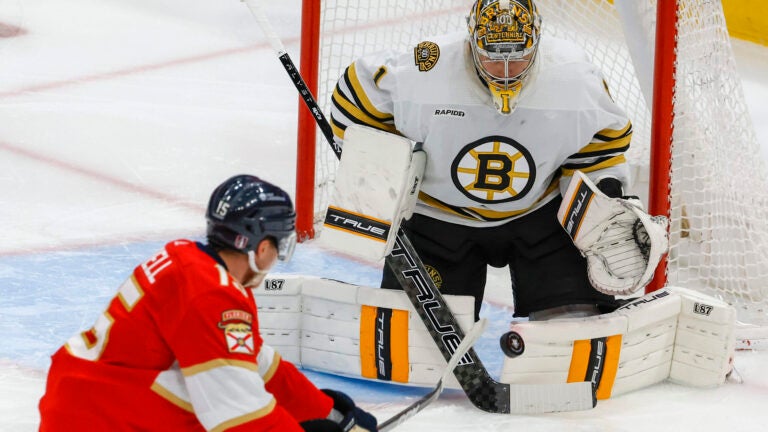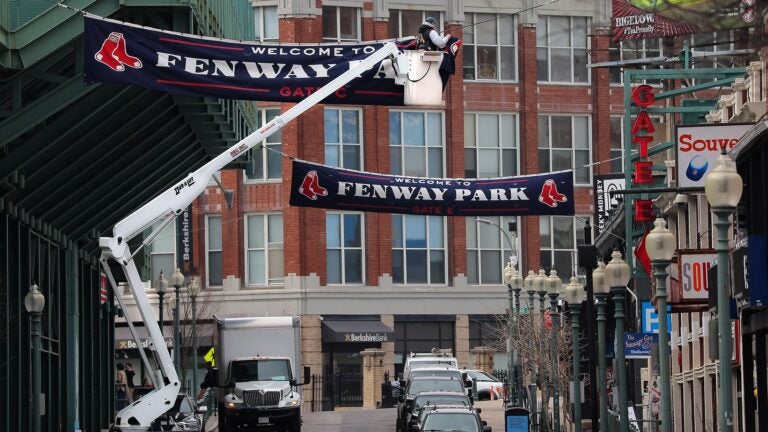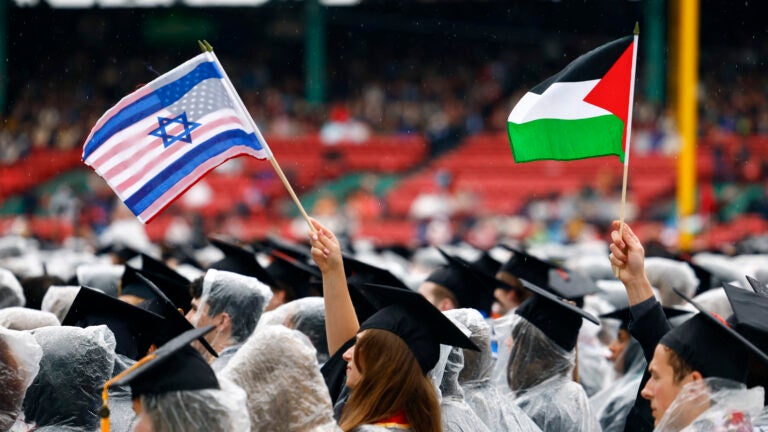What to know about the growing calls for Charlie Baker to #ShutDownMASS
The Massachusetts governor announced new restrictions on public life in response to the coronavirus outbreak. Some local officials say it's not enough.
Gov. Charlie Baker announced sweeping new restrictions Sunday night in response to the coronavirus outbreak in Massachusetts, including mandatory statewide school closures, a ban on gatherings of more than 25 people, and prohibition against dining in at restaurants and bars.A growing number of people are calling on him to go further to blunt the spread of the contagious disease.
<hr>
<h2>Baker bans gatherings over 25 people </h2>
<hr>
A petition called #ShutDownMASS has garnered more than 14,000 signatures in less than 24 hours. Launched earlier Sunday by Somerville City Councilor Ben Ewen-Campen, the petition calls on Baker to “shut down all non-essential businesses in Massachusetts,” following the example of aggressive — but, they say, imperative — social distancing efforts in countries like France in the face of the pandemic.
The petition also calls for direct financial assistance to those who would be affected by the shutdown, including paid leave for workers and support for small businesses.
“We recognize that there will be severe economic effects from a shutdown, and we will undoubtedly need Federal and State-level financial assistance,” Ewen-Campen wrote. “Yet the consequences of ‘business as usual’ will be far worse.”
Experts say aggressive social distancing and limited movement by individuals make a crucial difference in efforts to stop the virus from spreading exponentially, which could overwhelm hospitals and lead to more deaths. While most schools and large events in the near future had been canceled, social distancing efforts in Massachusetts had been largely voluntary up until this weekend, which illustrated the limits of such an approach.
The #ShutDownMASS petition came after images of lines of bar-goers in South Boston celebrating the St. Patrick’s Day weekend as usual in the midst of the pandemic drew condemnation on social media from those espousing social distancing (a number of bars did agree to close Sunday to address the issue). And after Baker initially said during an interview Sunday morning that he would leave the decision to close bars and restaurants to municipalities, the #ShutDownMASS petition quickly gained momentum among elected officials in the densely populated, liberal cities around Boston.
“Voluntary social distancing is not working,” state Rep. Mike Connolly, a Democrat representing parts of Cambridge and Somerville, tweeted Sunday, voicing support for the petition.
To be sure, the duty will be on state and federal government to redress the many hardships that will be caused by this emergency action. However, right now we must do everything possible to avoid the collapse of the healthcare system in Massachusetts. #COVIDー19 #ShutDownMASS
— Mike Connolly (@MikeConnollyMA) March 15, 2020
Connolly was joined Sunday afternoon by Jesse Mermell, a Democratic congressional candidate from Brookline, who called on Baker to close all schools and non-essential businesses at least through April.
“It’s time for real leadership closer to home,” Mermell said in a statement. “That means listening to public health experts, taking a clear-eyed look at what’s happening in parts of the world that have been dealing with the impacts of this virus for weeks, and shutting down non-essential public and private operations here in the Commonwealth without delay.”
Baker’s order Sunday night took strides in that direction. As the number of COVID-19 cases in Massachusetts rose to 168, the Republican governor announced the three-week shutdown of restaurants and gatherings of more than 25 people would begin Monday. The order does not apply to grocery stores and pharmacies and allows restaurants to offer takeout and delivery services.
#ShutDownMASS petition supporters applauded Baker on Sunday, but say there’s still “more to do,” as Connolly put it.
“I think it’s a major step in the right direction,” Ewen-Campen, who is also a biologist at Harvard Medical School, told Boston.com in an email Sunday night. “I’m hoping to see more clarity around how workers and businesses will be protected.”
Through both legislation and regulatory measures, Baker is looking to waive the one-week waiting period for collecting unemployment benefits, which will be available to those whose workplaces temporarily shut down due to the coronavirus. Employers will also be allowed to ask for a 60-day grace period to file quarterly reports and pay contributions. Pending legislation at the federal level would also expand unemployment insurance and provide paid leave to certain employees
In an update on the petition webpage Sunday night, Ewen-Campen said that there needs to be “far more aid and assistance from the State and Federal governments for working people and small businesses.”
And while Baker’s gathering ban applies to non-essential businesses like shops and gyms, it does not order them to shut down. The governor did note Sunday that his order doesn’t preclude more aggressive action by local officials.
Cambridge may be moving in that direction. Before the #ShutDownMASS petition was even launched, Mayor Sumbul Siddiqui wrote a Facebook post Sunday morning recommending a shutdown of all non-essential businesses. Siddiqui was echoed by Cambridge City Councilor Alanna Mallon, the city’s vice mayor, who stressed that statewide action was necessary.
“You need to do the thing that seems insane TODAY, because three days later it will feel crazy that you didn’t do it WEEKS ago,” Mallon tweeted.
For now, the #ShutDownMASS petition is not calling for Baker to go as far as Italy or Spain, where residents have been directed to stay indoors with few exceptions (such as buying groceries, going to work, or accessing health care) as officials there try to manage soaring COVID-19 cases. The better comparison is the shutdown in France, where all shops and businesses — except those offering essential services, like grocery stores, banks, and gas stations — have been order to close, as The New York Times reported Sunday.
“The critical first step is to limit gatherings, including in restaurants and bars and other non-essential businesses, in order to limit spread,” Ewen-Campen said. “If public health officials become convinced that further restrictions are necessary as we learn more, I would certainly defer to them, but for the time being I think it’s essential that residents understand the importance of flattening the curve.”
Anthony Fauci, the director of the National Institute of Allergy and Infectious Diseases, hasn’t ruled out a national lockdown in the mold of Italy. But for now, the federal government is only going so far to recommend that events with more than 50 people over the next eight weeks be canceled or postponed. There are also legal limitations and civil liberty concerns around extensive restrictions on public life.
Baker repeatedly batted down rumors Sunday that there were plans of ordering a statewide quarantine in Massachusetts, in which residents would be ordered to “shelter in place.”
“We have no plans to do that,” he said.
<hr>
<h2>Your 60-second guide to social distancing during the coronavirus outbreak</h2>








Conversation
This discussion has ended. Please join elsewhere on Boston.com